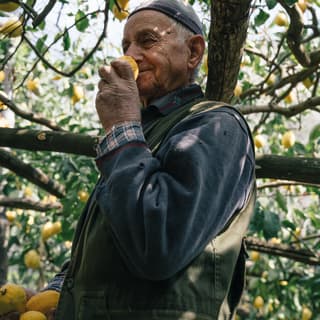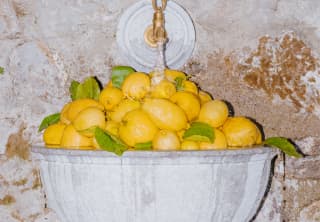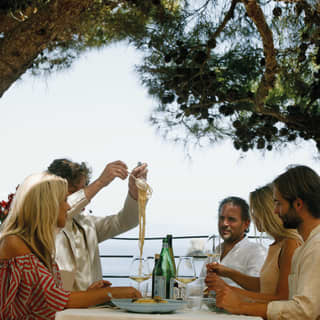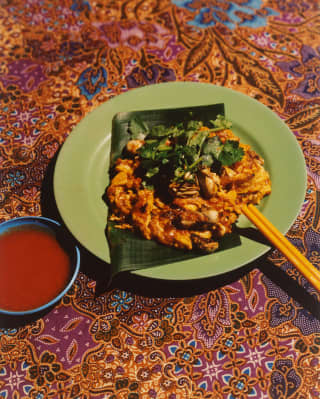A Longing for Lemons
A Longing for Lemons

Sardinian-based chef and food writer Letitia Clark, whose recipes are inspired by Italian cooking, has a passion for lemons. Here, she tells us why those grown in Amalfi are the Holy Grail…
The first lemon I ever fell in love with was made of plastic. It had perfect dimples, a screw-apart middle and sat on the top shelf of my granny’s fridge. Inside we’d find odd halves and wodges that had been stuffed there to sit and wait until she re-found them weeks later; sad, soggy and spotted with blue. If she made a prawn cocktail, potted shrimp or served anything in an avocado ‘boat’ it had a neat little lemon wedge beside it. Seeds removed, shining sides, pointed tips. If we neglected to squeeze it thoroughly (to the point of near-dry defeat) it was whisked away and smuggled back into the special Lemon Keeper.
Lemons were precious.
The second lemon I ever fell in love with was inside a bottle of Jif: a little green glass bottle filled with lemon juice with a lemon yellow lid, shaken madly over my pancakes by the same granny, who had just loaded them with sugar. “For grit,” she’d say, with a zesty wink. After the squeezy plastic Jif lemon was introduced, pancake day became pregnant with possibility; this lethal yellow missile could fire stinging streams of juice into my little brother’s eye. My mum even tried and failed to grow lemons at home. Endless sad saplings came and went, and never a fruit was seen.
And then when I went to work in restaurants I was introduced to real Amalfi lemons for the first time. The size of them! Their stems and leaves. Lemons with leaves! The most beautiful, big, green and yellow leaves curled at jaunty angle from this enormous, oddly-matte and highly perfumed fruit, covered all over with the deepest indentations. A world away from the shiny, sad little golf-balls we saw in the supermarket. Their noble rinds were half an inch thick and purest white, framing perfect pale segments bursting with juice. We hacked them in half and served them (leaves and all) on every plate.

Every true lemon-lover knows that the lemons of Amalfi are the Holy Grail. Famed for their enlarged size, their tapered shape and their sweetness, their official name is Sfusato Amalfitano, sfusato being the Italian word for spindle, perhaps referring to the lemon’s characteristic elongated shape. Meanwhile in damp London, I dreamt of hot days wandering among succulent lemon groves.
After a lifetime of vicarious citrus worship I finally moved to Italy, to Sardinia, in August 2017. And now I live in a place where lemons the size of large rodents fall off the trees. Not quite the Amalfi coast, but close. The other day I spotted a basket full of them on a doorstep. ‘Help yourself ’ read the sign, ‘but leave the basket’. After five years of being surrounded by lemons: those in my garden and lemons overhanging walls and lemons spied through gateways and lemons littering the street and shopping bags of lemon as gifts, you’d think I might be bored of them, but you’d be wrong. Is it possible to be bored by lemons?
As soon as I moved to Sardinia I hot-footed it to Naples the following year. Each street boasted shops strewn with strings of plastic lemons; inside were little yellow bags of lemon soap, lemon-shaped bottles of limoncello, lemon-printed tea towels, lemon-flavoured pasta, glass jars of lemon sweets. A lemon frenzy. We saw Pompeii, but we lost the lemons; it wasn’t the right time of year and it rained nonstop. I came home with strings of the plastic ones and a tea-towel trophy. I read about a pudding – a dolce – that I still dream of: the Delizia Al Limone – an elaborate construction of a domed lemon sponge layered with lemon cream, soaked in lemon glaze and limoncello, topped with a perfect nipple of whipped cream and lemon zest. Friends came to visit me and they managed to make it to Amalfi, finding both the objects of my frustrated desire; real Amalfi lemons, branches sagging under their weight, and the plucky and plump cake-and-custard lemon boob. They ate one daily in my honour and sent me photos to weep over. One day I will make it there. Meanwhile I can but dream. And make this Uplifting Lemon Linguine.
Uplifting Lemon Linguine
To make a plate of of uplifting lemon linguine, take a large handful of linguine for each person. Throw it in highly salted water at a rolling boil. Meanwhile, warm a knob of butter per person in a pan over a low heat.
Add the finely grated zest and juice of a lemon. Remove from the heat and set aside in a bowl. Add an egg yolk, a scoop of mascarpone and a generous pinch of salt, and a good grating of parmesan or pecorino.
Drain and toss the pasta in the bowl while still hot, stirring well until creamy. Add some pasta cooking water to loosen if necessary. Serve with extra basil or cheese if you like.

Delve deeper into
You might also enjoy

Celebrating Britain’s Culinary Tapestry
From April to October 2025, our iconic train reunites with star chefs Theo Randall, Atul Kochhar, Phil Howard and Andrew Wong for the relaunch of the Celebrity Chef Dinners series. Today, join our special guests to find out what modern British food means to them and how together, we celebrate the diversity of Britain’s culinary scene.

Ambient Films: The New Mindfulness?
In a world dominated by short, snappy videos vying for our attention (the span of which, let’s face it, is ever shrinking), long-form ambient films on YouTube have become the ultimate antidote. As Belmond’s slow TV series ‘Long Shots’ launches – taking you to diverse destinations, from Rio to Portofino – we take a closer look at this slow media phenomenon.

Recipe: Benoit Blin’s Festive Mince Pies
Discover the best mince pie recipe from celebrated pastry chef and Bake Off: The Professionals judge Benoit Blin. With traditional festive spices and buttery pastry, it’s the perfect recipe for Christmas, where nights are long and the cosiness of the kitchen calls.

What to Wear at Maroma
Behind the doors of our painstakingly renovated hotel in the Riviera Maya, a new space dedicated to emerging and established local designers awaits.

Recipe: André Chiang’s Oyster Omelette
Chef André Chiang has opened nine restaurants around the world, including the two Michelin star restaurant RAW in Taipei. Here he steps out from the kitchen and into the vibrant hawker markets of Penang with his version of an oyster omelette, from ‘Penang: Recipes & Wanderings Around an Island in Malaysia’, Belmond’s new cookbook with Apartamento.

How Conservation Is Getting Creative
The ocean is the world’s largest ecosystem, yet it is at risk like never before due to rising temperatures, overfishing and declining coral reefs. Emma Love, contributing editor at Condé Nast Traveller, meets a passionate cohort who think it’s not too late to turn the tide.

The South African Fashion Designers To Watch
As Cape Town’s cultural dynamism goes from strength to strength, Johannesburg-based writer Zanele Kumalo spotlights the fashion scene’s game-changing names to know.